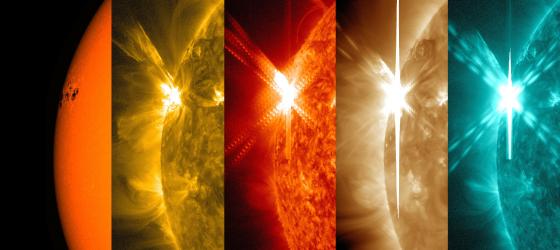Where and when
Vienna, Austria – April 23rd-28th, 2023
The EGU23 Assembly brings together geoscientists from around the world, especially early-career researchers, in a forum that provides an opportunity to present their work and discuss their ideas with experts in all fields of space weather and geoscience in general.
The MIDA group will take part in the conference with two posters, presented by Michele Piana and Anna Volpara, and a talk by Sabrina Guastavino:
- Poster 1 – Speaker: Michele Piana
Title: The STIX imaging concept: model for data formation and image reconstruction methods for the Spectrometer/Telescope for Imaging X-rays on-board Solar Orbiter
Autors: Michele Piana, Anna Volpara, Paolo Massa, Andrea Francesco Battaglia, Emma Perracchione, Anna Maria Massone, Federico Benvenuto, Gordon Hurfort, Säm Krucker.
- Poster 2 – Speaker: Anna Volpara
Title: Spatially resolved imaging spectroscopy with the Spectrometer/Telescope for Imaging X-rays on-board Solar Orbiter
Autors: Anna Volpara, Paolo Massa, Anna Maria Massone, Michele Piana.
Talk 1 – Speaker: Sabrina Guastavino
Title: The path from scientific to operational flare forecasting: a deep learning approach
Autors: Sabrina Guastavino, Francesco Marchetti, Federico Benvenuto, Cristina Campi, Anna Maria Massone, and Michele Piana
Abstract: In our view, machine/deep learning for flare forecasting is still more a promise for future scenarios than the reference framework for current operational facilities. This delay from the application of AI methods in research settings to their use for real-time forecasting is probably due to the persistence of technical open issues involving, by instance, the optimization strategy of the training phase, the quantitative assessment of the prediction performances, the reduction of the computational burden. This talk proposes a video-based deep learning approach to flare forecasting in which the optimization of the network’s parameters is realized by means of a probabilistic score-oriented loss function, the training procedure accounts for the part of the solar cycle progression when the prediction is requested, and the prediction performances are assessed by means of value-weighted skill scores that give greater importance to the values of the prediction than to its quality. The talk will also show the operational potentialities of this approach and discuss how feature selection may reduce the information redundancy, thus increasing the computational efficiency.
Credits
featured photo: © NASA/SDO/Wiessinger
